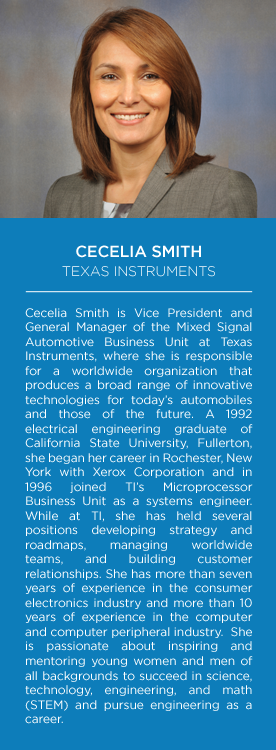Celebrating Engineers Week, Part 2 A Q and A With Cecelia Smith
Laura DeMoss |
February 25, 2015
To celebrate Engineers Week 2015 and the many ways in which engineering touches our daily lives, we reached out to several exceptional women engineers to learn about their paths to engineering, their roles as mentors, and their advice for students aspiring to STEM careers. Today, we hear from Cecelia Smith, Vice President and General Manager of the Mixed Signal Automotive Business Unit at Texas Instruments.

The following has been edited and condensed for clarity.
Tell us about your path to becoming an engineer.
Growing up, I had a passion for science, but I didn’t know much about engineering. In college, I took an electronics lab night course, just to try something new, and I really enjoyed it. I enjoyed the hands-on work of manipulating equipment and seeing how the theoretical and the practical were being married up right there in front of my eyes. One day my professor tapped me on the shoulder and suggested I consider electrical engineering as a major, and from that point I was on the path to becoming an electrical engineer.
Through college, as I was doing internships, I was still trying to figure out what type of engineering work would interest me the most. As I thought more about what I really enjoyed doing, it always came back to two things: I loved answering really tough engineering problems and I loved working with people to understand the real-world problems they needed to solve. That led me toward pursuing opportunities in applications engineering.
How has working with TI supported your professional growth?
When I initially visited TI to interview 19 years ago, I was looking around at who was walking the halls, how they were dressed, how they were addressing each other. I was looking for respect, professionalism, and diversity. And that’s exactly what I saw. It was a dream job with a dream company and I went for it. Since then, I have continued to pursue professional growth opportunities that match the priorities and direction of TI, while working closely with customers to help define and design products to meet their needs.
What kinds of challenges have you faced on your path to becoming an engineer?
In school, I was always one of two females of in any given class, especially in electrical engineering. I’ve heard some girls get intimidated or bothered by that, but I wasn’t going to allow it to be a barrier for me. My interpersonal skills have really been helpful in addressing issues that could have been challenges. I like people of all talents and backgrounds and I really enjoy being part of bright, diverse teams. The differences get me charged up and excited about the opportunity to bring more new ideas and perspectives to the table. That’s the type of environment and culture that academia fosters, and one that is embraced at TI as well.
What advice do you give girls and young women who are interested in engineering?
I tell girls to be themselves. And make sure that you understand that your work doesn’t speak for you. You need to speak up and speak often. We’re hiring you for your brain, and we want to hear what you have to say. Communicate what you learn, communicate what you know, and communicate how you’ll continue to improve. One piece of advice I always give is that you’re in charge of you—your career, your continuous development, and your life—so approach things that way.
Have you had mentors that influenced you on your career path?
Throughout my career, I sought out mentors whose leadership style, business capabilities, and strategic vision I admired—the traits that I wanted to grow in myself. I would just knock on their doors and ask if I could talk with them and ask them about how they got to where they were and the things I might have had challenges with. That’s one wonderful thing about TI. Regardless of where you are in your career, if you’re wanting to improve yourself and continue to learn, everyone is willing to help you do that.
You’re active in the community as a mentor yourself. What does mentoring mean to you now?
I’ve been a mentor to girls in elementary, middle, and high school since I was in college. I love to see the spark of curiosity across the table. I like to probe and dig and let them know that being curious is an attribute that you never want to lose. Just last week, I had the wonderful opportunity to be part of a group of female engineers at TI that came together to spend time with an eighth-grade girl named Angeles who is interested in pursuing a STEM career. Mentoring others and educating them about career opportunities in STEM is one of TI’s core values and is a big part of what our company culture is all about.
What do you wish more people knew about engineering?
Engineering allows you to make a big impact and actually change the world. I think that’s one of the things I didn’t realize before I entered the field. The type of impact that we get to make is equivalent to how a doctor helps their patient. As an engineer, I get to do what I love: work with people to solve tough problems and use creativity and vision to make the impossible possible.